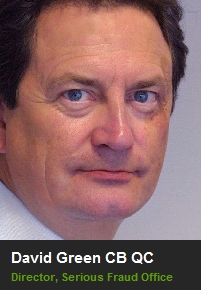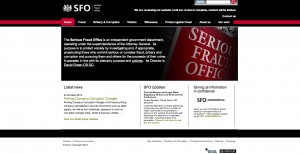All you need to know about self reporting, Bribery Act & Proceeds of Crime - Written by Barry & Richard on Sunday, October 27, 2013 4:58 - 0 Comments
YES, YES, YES, YEEES, YEEEEES, YEEEEESSSSS. But. SFO Director repeats benefits of Self Reporting. Again.
What Meg Ryan and David Green, SFO Director have in common.
Speech of David Green CB QC Director of the SFO at Pinsent Masons and Legal Week Regulatory Reform and Enforcement Conference
24 October 2013
“I recently attended a private gathering of general counsel from a number of major multi-national corporations. I spoke on the subject of corporate self-reporting of instances of suspected criminality, including bribery and corruption.
There was then a Q&A session, during which 2 attendees indicated that the advice they were receiving from their external lawyers was that such matters should NOT be reported to the SFO, because “the SFO was not as helpful as it used to be”. There followed a vote on the issue, which was firmly in favour of self-reporting. Well they would, wouldn’t they.
I became DSFO in April 2012.
It is now a year since I changed the published SFO guidance on self-reporting by corporates.
The guidance I inherited contained an implied presumption that self-reported misconduct would be dealt with by civil settlement rather than prosecution.
I took the view that no prosecutor should appear to offer such a guarantee in advance. As a prosecutor, you can never anticipate what set of facts and conduct might be next in through the door.
I took the guidance back to the historic position agreed with the Director of Public Prosecutions: that we would apply the full code test for crown prosecutors to self-reported criminality. In other words, we ask (after our own investigation): is there sufficient evidence to prosecute, and if so, is a prosecution in the public interest?
The SFO’s message is carefully expressed and nuanced. Assume the evidential sufficiency test is passed. If a company made a genuine self-report to us (that is, told us something we did not already know and did so in an open- handed, unspun way), in circumstances where they were willing to cooperate in a full investigation and to take steps to prevent recurrence, then in those circumstances it is difficult to see that the public interest would require a prosecution of the corporate. [our emphasis]
Some parts of the blogosphere seem to have difficulty with this [NB: the Director expressly excluded us from this] writing that it means self-reporters will be prosecuted. It means no such thing.
Some corporate lawyers complain that the new approach (actually, the principled, established approach) creates “uncertainty”. I disagree: and I think that when they say “certainty” it is code for “guarantee”.
For the avoidance of doubt, the SFO continues to receive self-reports, and I anticipate the numbers will only rise as Deferred Prosecution Agreements (DPAs) bed in next year.
So why should a company self-report instances of suspected criminal misconduct to the SFO?
- A self-report at the very least mitigates the chances of a corporate being prosecuted. It opens up the possibility of civil recovery or a DPA.
- There is the moral and reputational imperative: it is the right thing to do and it demonstrates that the corporate is serious about behaving ethically.
- If the corporate chooses to bury the misconduct rather than self-report, the risk of discovery is unquantifiable. There are so many potential channels leading to exposure: whistle-blowers; disgruntled counterparties; cheated competing companies; other Criminal Justice agencies in the UK; overseas agencies in communication with SFO; and the SFO’s own developing intelligence capability, to name but a few.
- If criminality is buried and then discovered by any of the above routes, the penalty paid by the corporate in terms of shareholder outrage, counterparty and competitor distrust, reputational damage, regulatory action and possible prosecution, is surely disproportionate.
- Last but not least, burying such information is likely to involve criminal offences related to money laundering under sections 327-9 of the Proceeds of Crime Act.
There are, I suggest, very powerful arguments in favour of self-reporting.
Once the decision to self-report has been made by the corporate, then the question of timing arises. Common sense suggests that an initial report of suspected criminality should be made to the SFO as soon as it is discovered. This surely protects the company against the SFO finding out by other means whilst the company investigates further. The corporate can then investigate in depth and report back to the SFO. The SFO will carry out its own assessment with possible use of S2A powers (in the case of bribery), and, if justified, the opening of a criminal investigation and the exercise of S2 powers.Self-Reporting.”
The Director’s speech at the Pinsent Masons conference is prominently positioned on the front page of the SFO website.
Opinion
It is widely said there is no benefit to a Self Report. We have always disagreed.
David Green QC, the director of the SFO has made clear that he wished to set the record straight (again).
In the words of Meg Ryan, in Harry Met Sally, Yes, Yes, Yes, YES, YES, *YEEEEES*
Yes, the guidance on self-report was stripped back to the established bedrock of the full code test and the Attorney General’s guidelines.
YES, the SFO will assess the evidence to see if it is sufficient to satisfy the evidential test for prosecution.
YEEEEEESSSSSS, the SFO will then apply the Public Interest test and decide whether to prosecute.
BUT.
David Green has made clear (yet again), in our view, that where a corporate comes in and tells the SFO about something that they do not know; where the disclosure of the issue to the SFO is not ‘spun’; where genuine and comprehensive action is taken to remedy the problem; and, where there is a serious commitment going forward to ensure no repeat *then* it is very *unlikely* that the Public Interest test would be satisfied and so it is *unlikely* that there would be a prosecution.
The Director made clear that a genuine self would open doors to DPA’s or Civil Recovery etc.
On the other hand, failure to self-report if detected by the SFO will be viewed as a serious adverse factor when assessing the Public Interest test.
We have consistently taken the position that in a world of outcomes a Self Report, properly done, will achieve a better result than letting the SFO find out for itself, investigate and prosecute. Many don’t believe this. In a straw poll we conducted while the Director of the SFO was in the room a material number of those present said that they would not Self Report.
In our view the gamble is this, namely do you think you’ll get found out? Because if you do then the outcome will almost certainly be less favourable.
That is what we have dubbed the robbers analysis – because they don’t go out to burgle on the assumption they’ll get caught or with any intention of handing themselves over.
The SFO Director warned offenders that white collar criminals should not expect any special treatment. No special courts or different rules. They should be dealt with in the UK criminal justice system along with other common criminals.
The next question is: how would you feel being lumped together in the same company as a common criminal. Because that’s the way the Director of the SFO sees you if you don’t Self Report.




